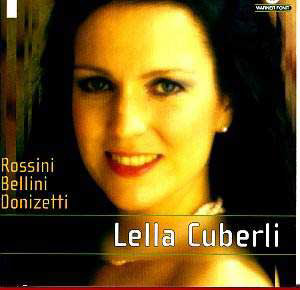Lella Cuberli has mostly been heard on disc in Mozart, having
been chosen for major roles in all three of Daniel Barenboim’s Berlin
cycle of the Da Ponte operas: Donna Anna, in "Don Giovanni",
the Countess in "Figaro" and Fiordiligi in "Così
fan tutte". She also sang Giunia in Silvain Cambreling’s recording
of "Lucio Silla". Her principal non-Mozartian appearance was
the soprano part in Herbert von Karajan’s last recording of the Beethoven
"Missa Solemnis". In every case her performance has been considered
one of the strong points of the set.
And yet it was in the pre-Verdian Italian school –
Rossini, Bellini and Donizetti – that she first made her mark. In spite
of her name, which she acquired by marriage anyway (she was born Miss
Terrell), she hails from Austin in Texas, but Italians took her to their
hearts and in the first years since she won a major competition in 1975
it seemed she was the answer to a prayer, the long-needed soprano able
to cope effortlessly with the virtuoso writing, but also the long legato
lines, of the bel canto school.
Yet it didn’t quite work out like that, and nobody
seems to know quite why. This disc has an essay by one of Italy’s most
knowledgeable writers on voices and singing, Rodolfo Celletti (translated
into good English), which points out that, though she has performed,
occasionally and almost by chance, Lucia di Lammermoor, Violetta and
Mimì, she has been called on above all to present a wide range
of little-known operas, oratorios, masses and concert works. Perhaps
she prefers it that way, for hers is not a rabble-rousing art. In all
of the arias on this disc, many of them recording premières in
1983, she demonstrates a voice which is even and easy right through
its range, as able to spin a long legato line as to negotiate the most
virtuoso roulades. In fast music she is well able to differentiate between
what has to be kept mellifluous and what has to be brilliant. She is
careful over words, always placing them so that they are present and
"felt", but are not permitted to break the beauty of the musical
line; this is also true of the recitatives which are certainly not inexpressive,
but one feels that it would be against her aesthetic ideals to pitch
in dangerously in the Callas manner, risking the odd scream or two.
So, while she is far from cold or inert, she is in some ways a musician’s
singer, and to this extent perhaps it not entirely unjust that she has
dedicated so much of her time to making rare works like those on this
disc shine again rather than carting her Violetta and her Lucia around
the world’s capitals. All the same, future generations who happen upon
these performances and look round at the discography of these three
composers in the 1980s and 1990s will surely wonder why on earth we
made so little use of Lella Cuberli.
Fortunately, care has been taken not only by Cuberli
but by all concerned, so we get each scena complete with supporting
singers – a mixed blessing in the case of Aldo Bertòlo’s rough
tenor, but Martine Dupuy’s contributions are a joy – and chorus. The
RAI’s Milan orchestra, since disbanded during a particularly dismal
episode in Italy’s cultural history, plays excellently under the vastly
experienced baton of Bruno Bartoletti; it boasts some extremely fine
woodwind soloists who were rather less in evidence at the orchestra’s
weekly concerts during the same period and I wonder who they were. The
recording is very clear without loss of warmth.
The booklet has, as I said, an essay on Cuberli by
Celletti which is also translated and full texts which are in Italian
only. Even if you can read that language you may feel, like me, that
it would have been helpful to have at least a brief outline of the actual
stage situation in which the excerpts are sung. But let’s not complain;
some rare and often very beautiful music (try the excerpt from "Rosmonda
d’Inghilterra") can be heard in performances of the highest quality.
Christopher Howell


